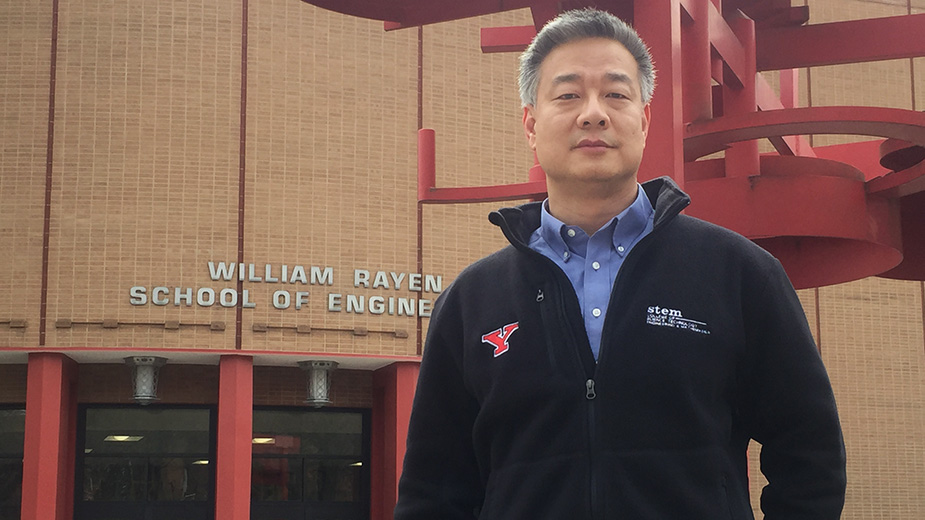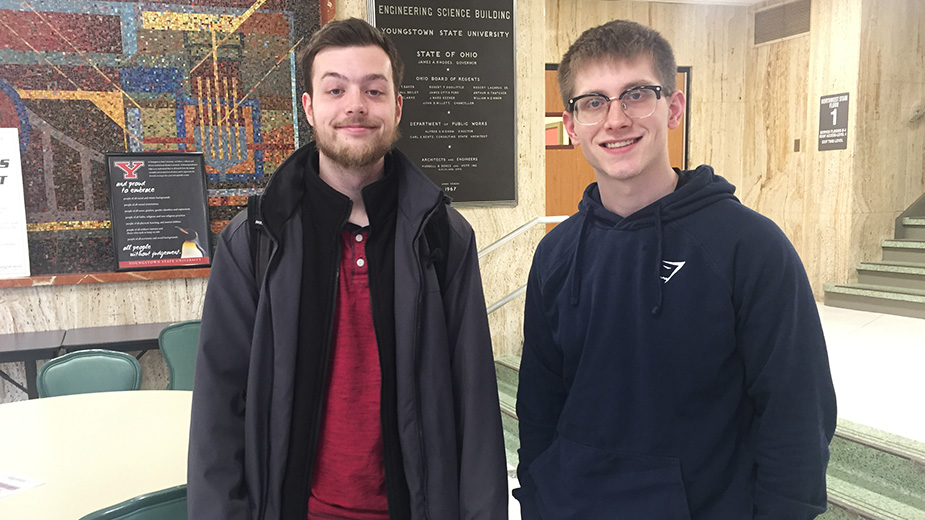YOUNGSTOWN, Ohio – Nathan Humphrey, a senior enrolled in the Rayen School of Engineering at Youngstown State University, has a simple explanation for selecting this particular career path.
“I like to build things,” he says.
Not to mention the prospect of landing a job that pays well when he graduates in June with a degree in mechanical engineering. In fact, Humphrey says he already has a position lined up at a local manufacturer where he now interns.
“I’ve received a lot of tactical skills from this program,” he says, from examining component designs, working with reverse engineering concepts and using the additive manufacturing process. “I feel I have a good grip on how things are made and how they work together.”
Engineers have never been in higher demand across the country, says the director of the Rayen School of Engineering, professor Frank X. Li. The school boasts programs in chemical, civil, mechanical, industrial and electrical engineering. The school operates within the YSU College of Science, Technology, Engineering and Mathematics, or STEM.
“The market for all five disciplines is growing,” Li says.
Some 600 undergraduate and 80 graduate students are enrolled in the Rayen School, Li says. The school works with major regional companies such as FirstEnergy and Goodyear, as well as major local manufacturers, to create a career pipeline for these students. “You name it, all of the companies are looking for new engineers,” Li says.
Even so, Li says the country’s universities do not produce enough graduates to satisfy demand. One company from the Toledo area, Li relates, recently contacted the department so it could draw from its pool of potential graduates. “They said they just used to recruit from the University of Toledo but they couldn’t get enough. That’s why they’re reaching out to us for potential employees.”
A critical part of the engineering school is making internships, part-time employment or co-op learning programs available to students, Li says. These provide hands-on, problem-solving experiences that engineers encounter in the field every day. Moreover, it encourages companies to educate and perhaps hire YSU graduates directly out of the program.
“Students here aren’t afraid to get their hands dirty,” he says.
Engineering students today can gain valuable experience at YSU’s Excellence Training Center, a hub of STEM-related education that includes robotics and 3D printing. Plus, the new YSU Watson Team Center now under development would provide an opportunity for engineering teams to perfect their projects as they prepare for national and regional competitions. These teams work on steel bridge projects, the concrete canoe, rockets, a Baja car and battle bots.
“Also, NASA comes up with different challenges every year,” Li says, and the new team center would provide the perfect venue for students to work on their ideas.
Last year, NASA launched a competition among universities to devise a mining robot that can operate on the lunar surface, Li says.
YSU engineering graduates have gone on to pursue graduate work at Carnegie Mellon University, Stanford University and Yale University, Li adds. Some of them have landed jobs with giant tech companies such as Google and Microsoft.

Li, whose background is in computer engineering, recalls two of his students who are brothers that grew up on a local farm. The younger one earned his undergraduate degree at YSU and secured a graduate position in computer engineering at Carnegie Mellon. “He never finished – because he was hired by Qualcomm. He’s a manager at Google now,” he says.
Inspired by his brother’s success, the older brother ditched his plans to be an accountant and enrolled in the engineering school, Li says. “Stanford offered him a $40,000 sign-on bonus to go straight into its Ph.D. program,” he says. “Halfway through, he quit and started his own company. A year later, Apple bought him out.”
While the YSU engineering program is small compared to others, its graduates nonetheless have the same opportunities, Li says. According to the U.S. Department of Labor’s Bureau of Labor Statistics, engineers earn a median annual wage of $100,640. Between 2020 and 2030, the job market is projected to grow by 6%, translating into nearly 146,000 jobs.
Li says there is growing interest in electrical engineering, prompted by growth in the electric vehicle industry. “NASA has talked about electrified aircraft,” he says, while Elon Musk has mused about electric tanks for the military. “That’s kind of the future,” he says.
About 30 full-time faculty teach and perform research in the engineering school, Li says. Landing new faculty isn’t easy, since academia is in constant competition with the more lucrative private sector. “We’re always competing with industry, which pays much, much higher,” he says.
Nevertheless, YSU’s engineering faculty has been successful in securing important grant monies for research and education. In January 2022, Pedro Cortes, assistant professor in the materials science and electrical engineering department, helped to land a $2.3 million grant from the Air Force Research Laboratory. The grant will be used to create a hub-and–spoke manufacturing consortium at the Excellence Training Center. The grant money was used toward the purchase of a Mazak 3D printer.
In late 2020, Cory Brozina, assistant director of the Rayen School of Engineering, received the largest single grant from the National Science Foundation in YSU history – $1 million.
“I work on student support and success,” Brozina says. “My main focus is on engineering education and [to] improve the outcome of engineering students.”
The $1 million grant is used to help boost enrollment in engineering among commuter universities and to create a model for other institutions to effectively recruit, retain and graduate engineering students who have similar challenges.
The project focuses on recruitment initiatives, especially on women’s outreach and pre-college programs to increase the number of students studying engineering at YSU. The grant will also fund $624,000 in scholarships over five years to two cohorts of YSU commuter students who are Pell eligible and pursuing baccalaureates in engineering fields.
The grant also includes funding for research to determine how YSU and other universities can best support the needs of engineering students who commute to campus.
Brozina says it’s important to work closely with first-year engineering students – focusing on tactile activities and professional skills. “Then, as they progress, there are different experiences in co-ops, internships, professional societies and to be prepared for what industry is looking for,” he says.
As seniors, students work on their capstone design projects, which often involve input from industry, on which Brozina says:
“Engineers from YSU can get a job right away. Most have them before they graduate. This country simply doesn’t produce enough engineers.”
The strong reputation of the Rayen School, the affordability of YSU and proximity to home were factors that brought freshman Dylan Batley to study here.
“I want to get into product development or become some sort of systems engineer,” says Batley, originally from New Wilmington, Pa. “I wanted a good engineering program that was affordable and close to home.”
Nathan Espenschied, a fourth-year mechanical engineering student, says the most important takeaways from the YSU program are the smaller class sizes and the close attention from faculty. “It’s much more personalized,” he says. “Our teachers care.”
Pictured at top: Nathan Espenschied and Nathan Humphrey, fourth-year mechanical engineering students.
